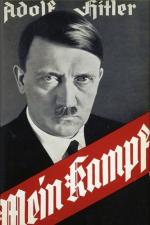
|
| Name: _________________________ | Period: ___________________ |
This test consists of 15 multiple choice questions and 5 short answer questions.
Multiple Choice Questions
1. When can naturalization take place?
(a) If the immigrant is fluent in German.
(b) If the immigrant has a full-time job.
(c) If the immigrant is not a criminal or political subversive.
(d) If the immigrant has some connection with Germany.
2. Just because work groups unite in a federation, it does not necessarily mean that they will become what?
(a) Intelligent.
(b) Unified.
(c) Useful.
(d) Strong.
3. What does Hitler emphasize in his speeches?
(a) His desire to lead Germany.
(b) His hatred of the Jews.
(c) The peace treaty.
(d) The various wars in which Germany has been involved.
4. What would be the purpose of the National Socialist trade union?
(a) To represent the occupational interests of its members.
(b) To be used as a tool of class struggle.
(c) To control the workers.
(d) To convince others to join the union.
5. What is one of the factors that distinguishes man from animal?
(a) Invention.
(b) Thumbs.
(c) Emotion.
(d) Language.
6. What are the results of all of the attempts at harming the party or its leaders?
(a) They are somewhat successful.
(b) They are damaging to the party and its leaders.
(c) They fail.
(d) They succeed.
7. To Hitler, the ability to feed the nation depends on what?
(a) Its soil.
(b) Its people.
(c) Its freedom.
(d) Its wealth.
8. How are the borders of these federated states created?
(a) With high walls.
(b) Through politics.
(c) Through peaceful negotiations.
(d) With barbed wire.
9. Toward what must the policy undertaken by present-day Germany be directed?
(a) Encouraging trade between Germany and other nations.
(b) Isolating and protecting the German states.
(c) Preserving the character of the German people.
(d) Securing freedom in the future.
10. What is the purpose of the National Socialist state?
(a) To protect the bearer of the culture.
(b) To protect Hitler.
(c) To protect the people.
(d) To protect freedom.
11. The first part in the battle is the __________________ of the existing state of affairs.
(a) Eradication.
(b) Tweaking.
(c) Making.
(d) Improvement.
12. Who are those who are either naturally born in the country or those who have been naturalized?
(a) Citizens.
(b) Foreigners.
(c) Minors.
(d) Voters.
13. Does Hitler feel that trade unions can be done away with?
(a) Some.
(b) Maybe.
(c) Yes.
(d) No.
14. Why does Hitler's movement use red posters at its meetings?
(a) To annoy the Jews.
(b) To cause fear in the German workers.
(c) To irritate the Marxists.
(d) To worry the Russians.
15. Are the successes of coalitions usually lasting?
(a) Maybe.
(b) Yes.
(c) No.
(d) Sometimes.
Short Answer Questions
1. What should people always ask regarding policies?
2. How does Hitler believe terror should be fought?
3. Wage differentials and economic progress do not make ____________.
4. What meetings does Hitler attend in the 1919-1921 period?
5. IF the world becomes more aware of the essence of its struggle and understands the value of race and personality and conducts itself accordingly, it will with almost mathematical certainty some day do what?
|
This section contains 528 words (approx. 2 pages at 300 words per page) |

|




